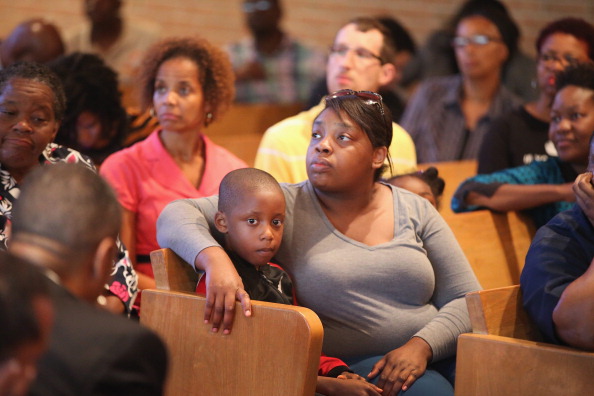
By Rachel O’Leary, Amnesty Interntional USA Acting Deputy Executive Director for Membership Mobilization
On August 9, Michael Brown, an unarmed 18-year old, was shot dead by a six-year veteran of the Ferguson police force. The next day, the community organized protests condemning the actions of the police and demanding to know the name of the officer who shot and killed Michael. Those actions continue still, a week later.
The day after the shooting, I sent a text to my colleague at 3:30 AM. It read, “We need to go to Ferguson.” Later that week, I was on a plane, leading the Amnesty International USA human rights delegation to Ferguson, Missouri.
Our goal: to observe police and protester activity, gather testimony, meet with officials, and offer support to the community. Importantly, our delegation also included organizers who supported local leaders in training community members on methods of nonviolent protest.
On the plane, I read everything I could find about the situation in Ferguson, and spent time reflecting about community, solidarity, and intention. My heart broke as I thought about Michael Brown, the plans he had for his future, the pain his family and community feel at his loss, and the outrage the residents of Ferguson feel after the police harassment and intimidation of a grieving community.
I’ve been a community organizer for over a decade, and heading into the field felt different this time; electric, heavy, as though time had stopped, leapt backwards and forwards at once. The events of the last few days in Ferguson have changed me, changed us. As a result of what has happened on the ground this week, new community organizing coalitions have formed and Congress has decided to take on the issue of military-style policing, an issue activists have been battling since the 1980s.
However, not everything has been about progress in Ferguson over the last week. On Wednesday and again last night, police tear gassed the crowd amid reports of unrest in the crowds of protestors. Despite this, there is a sense that the ground is slipping from the foundation of militarized law-enforcement and a rising awareness and intolerance of the racial bias that is so pervasive in arrest-related deaths — even if it is two steps forward, one step back. And this is why we fight for human rights and human rights defenders.
We fight because we know that race, class, and identity must no longer determine how people access justice. We fight because we know that when police use excessive force or protesters turn to violence, no one is above the law. We fight because we know that all lives are equal and must be valued equally. We fight together in coalition with each other because we believe in people-powered solutions.
Our struggle isn’t perfect, and Ferguson is no different. Luckily, perfection isn’t the goal. None of us have the solution. Our work is about contribution. And this week, Amnesty International’s contribution is around standing with the community in Ferguson and lifting up the voices of the people who are working on human rights and social justice on the ground.
Our human rights delegation, all 13 of us, are proud and honored to stand with the community organizers, leaders, healers, and elders in Ferguson to demand justice and an end to the pervasive discrimination and violence that people of color face when interacting with police. More than that, we are committed to building a better, stronger movement in solidarity with coalitions and community members on the ground who are working to protect human rights at home– one that endures when the cameras leave and the #Ferguson hashtag stops trending.
Today, I’d like to ask you for your contribution. People powered solutions demand that we get active. Today, there is a family in Ferguson who is mourning the loss of their son.
Take action now to tell Missouri officials to investigate police conduct and avoid unnecessary force.
